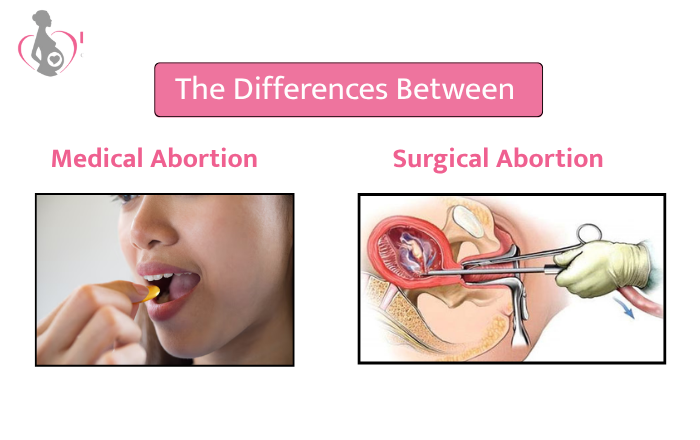If you’re facing an unplanned pregnancy and exploring your choices, it’s important to understand the differences between medical abortion and surgical abortion. These two methods work in different ways, and knowing what to expect from each can help you make the decision that feels right for you.
Many people search for terms like “difference between abortion pill and surgical abortion” or “which abortion method is better”—and this article aims to provide clear, simple answers to those questions. Whether you’re looking for privacy, quick recovery, or guidance from a gynecologist, we’re here to walk you through it.
What is Medical Abortion?
Medical abortion, often called the “abortion pill,” uses medication to end an early pregnancy. It’s usually recommended during the first 6 to 10 weeks.
– How it works:
Two types of pills are usually taken:
Mifepristone – This pill blocks the hormone needed for pregnancy to continue.
Misoprostol – Taken hours later, this pill causes the uterus to contract and push out the pregnancy.
– What to expect:
- You may have cramping and bleeding, which can be similar to a heavy period.
- The process often takes a few days.
- It can be done at home, but a follow-up with a doctor is important to make sure it worked.
– Pros:
- No surgery required
- Can be done in private
- Feels more natural for some people
– Cons:
- Bleeding can last longer than a surgical abortion
- Not suitable if you’re too far along in the pregnancy
- May involve more cramping and waiting
What is Surgical Abortion?
Surgical abortion is a medical procedure done in a clinic or hospital. It’s often used when the pregnancy is more than 10 weeks or when someone prefers a quicker process.
– Types of surgical abortion:
- Vacuum Aspiration (up to 14–15 weeks): A gentle suction removes the pregnancy from the uterus.
- Dilation and Curettage (D&C): A slightly more involved procedure done in later stages.
– What to expect:
- The procedure takes about 10 to 20 minutes.
- Recovery is usually quick—many people feel normal after a day or two.
- You’ll likely be given some type of pain relief.
– Pros:
- Done quickly in one visit
- Less bleeding after the procedure
- Very effective
– Cons:
- Involves going to a clinic
- Might feel more invasive for some people
- Slightly more medical risk than pills, though rare
| Feature | Medical Abortion | Surgical Abortion |
|---|---|---|
| How it’s done | Pills at home or clinic | Minor procedure in clinic |
| Pregnancy stage | Up to 10 weeks | 6 weeks and above |
| Time to complete | Several days | Around 10–20 minutes |
| Bleeding and cramps | More bleeding, stronger cramps | Less bleeding, faster recovery |
| Privacy | Can be done at home | Done in a clinic |
| Effectiveness | Around 95–98% | Over 99% |
How to Decide Which Option is Right for You
Here are some things to consider:
- How far along are you? If you’re under 10 weeks, both options may be available.
- Are you okay with taking pills at home? Some prefer the privacy; others want the process done quickly.
- Do you want it over in one visit? Surgical abortion might be better.
- What does your doctor recommend? They’ll consider your health, timing, and preferences.
Safety, Side Effects, and Aftercare
Both methods are safe when done under medical supervision. Side effects are usually mild but should be monitored.
– Medical Abortion:
- Cramping, heavy bleeding, nausea
- Bleeding may last 1–2 weeks
– Surgical Abortion:
- Light bleeding, minor cramping
- Most people return to normal within a few days
– Aftercare Tips:
- Rest for at least a day
- Avoid heavy exercise for a few days
- Use pads instead of tampons until bleeding stops
- Follow up with your doctor
Have Questions? Dr. Pushpa Soni in Kalyani Nagar Can Help
If you’re unsure about which method is best for you or have questions, you don’t have to go through it alone. Dr. Pushpa Soni, a gynecologist in Kalyani Nagar, provides guidance and safe procedures for women who are exploring their abortion options.
You can talk to her in a calm, respectful environment, ask questions freely, and get the help you need without pressure.
FAQs
Q1: Can I get pregnant again after an abortion?
Yes. Abortion does not usually affect your ability to get pregnant in the future.
Q2: Is abortion legal in India?
Yes, abortion is legal in India up to 24 weeks in many cases, especially if approved by a doctor.
Q3: When should I see a doctor after an abortion?
A follow-up visit 1–2 weeks later is often recommended to ensure everything is okay.

